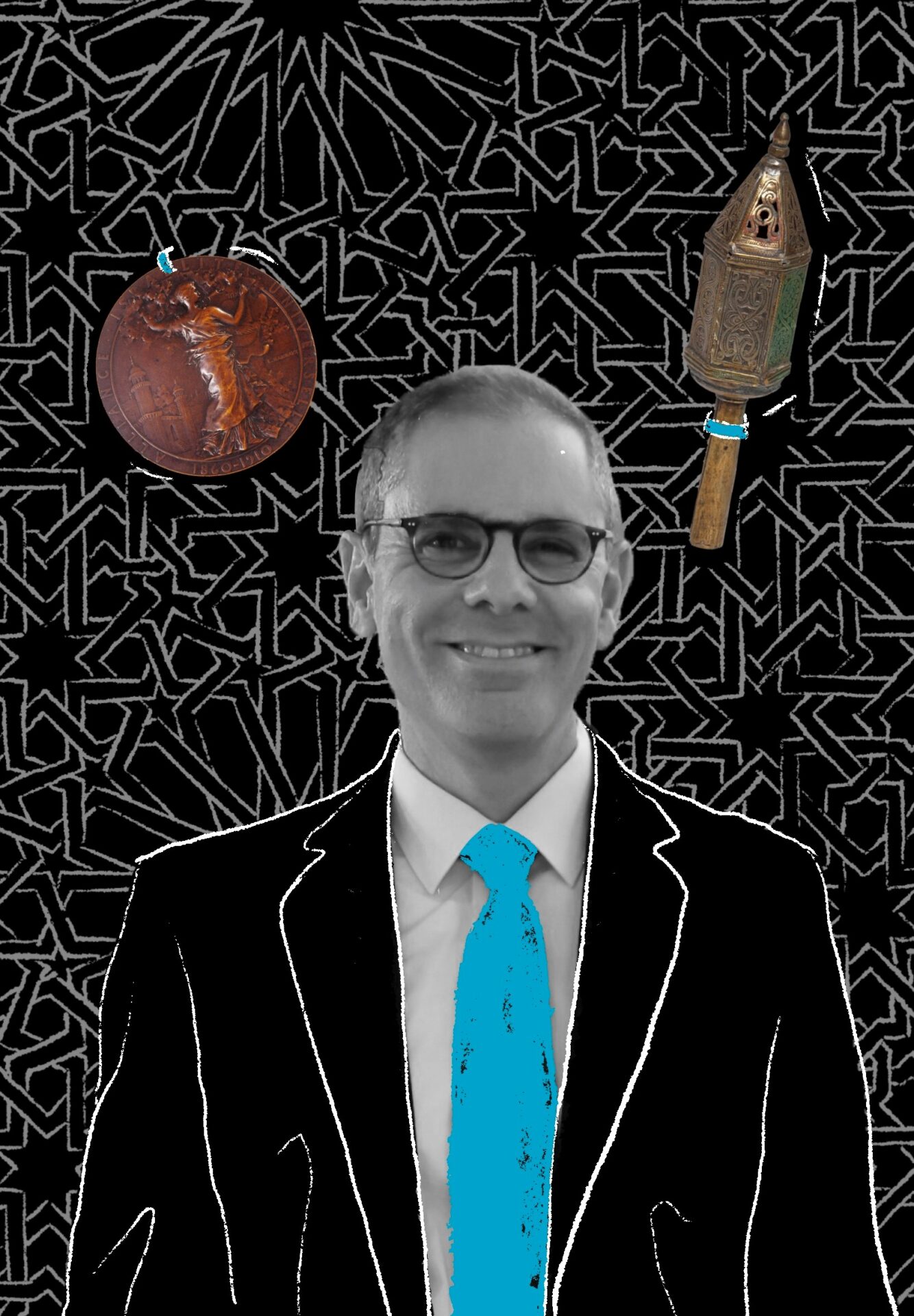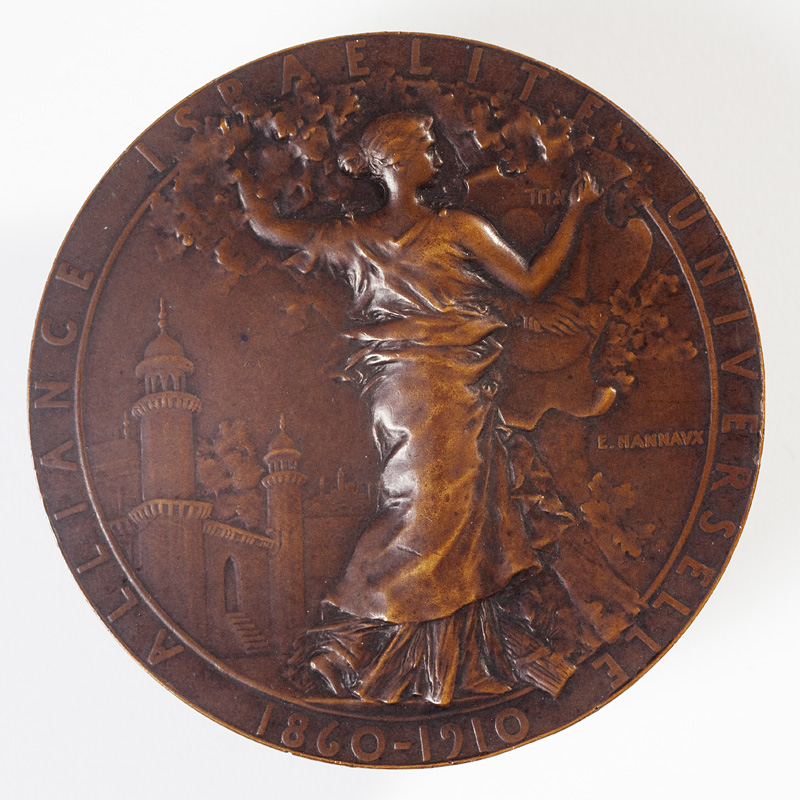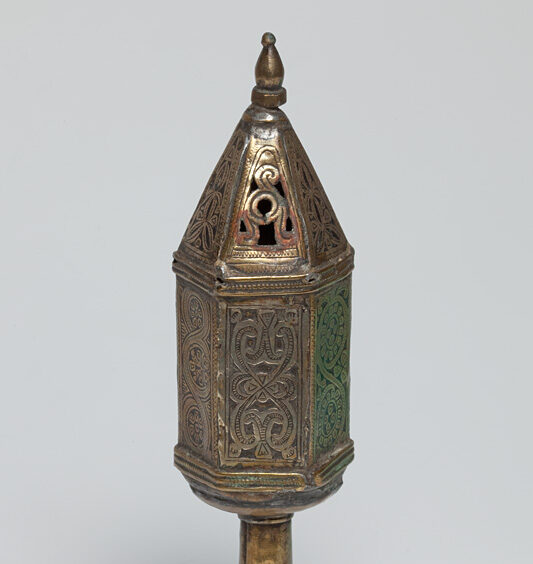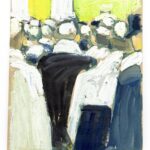Daniel Zisenwine, collage by Marva Gradwohl
Medal celabrating the 50th anniversary of the Alliance Israélite Universelle, 1910, JMS 557
Medal celebrating the 50th anniversary of the Alliance Israélite Universelle, 1910, JMS 557
Rimon, Torah finial, Mediterranena, 19th century, JMS 784.
Who were the Jews of North Africa?
Four Questions to Daniel Zisenwine
Daniel Zisenwine is a Middle Eastern studies scholar and a visiting lecturer at the University of Basel, teaching, among others, about Jewish communities in North Africa. Museum director Naomi Lubrich spoke with him about Jews in Muslim-majority societies, about the spice and leather trade and about the consequences of francophone education.
Naomi Lubrich: Daniel, who were the Jews of North Africa?
Daniel Zisenwine: The Jews of the Maghreb lived in Morocco, Algeria, Tunisia, and parts of Libya. These communities were regionally different: Urban Jews lived along the coast, rural Jews in the mountainous areas of the Atlas. In 1492, the Spanish Inquisition brought an influx of Sephardic Jews to North Africa, who founded new, separate communities, though differences later subsided. Jews lived in these Muslim-majority societies in greater and lesser seclusion, usually in walled, but porous, Jewish neighborhoods, Mellahs. They were recognized under Muslim religious law as Dhimmis, members of a monotheistic religion, which restricted them but offered some degree of protection and rights. The Jews of North Africa had considerable autonomy, for instance in questions of law and education. Anti-Jewish sentiment broke out periodically, but it was less aggressive than in Europe.
NL: There are various terms to designate North African Jews. Which are correct?
DZ: I use the term «Maghreb,» which means «West» and designates the larger cultural and political region. In Israel, the term «Mizrahi» has become widespread for Jews from the Middle East, including North Africa, but it is inaccurate: «Mizrahi» means «East,» which, from an Israeli perspective, is diametrically opposed to the Maghreb. Even less correct, but unfortunately also widespread, is the term «Sephardic» which refers specifically to the communities founded by Spanish Jews after their expulsion. Some have offered the term «Arab Jew,» seeking to underscore the linguistic and cultural background of these communities. This term is also inaccurate, as few Jewish sources from these communities used that designation.
NL: Was there much contact between the Maghrebi and European Jewish communities?
DZ: There was contact in the pre-colonial era, mostly in trade. The most important contact points were Livorno in Italy, with its port frequented by Tunisian merchants, and Marseille in France, with its counterpart port for Algeria and Morocco. The Maghreb region produced spices and leather, from shoes to handbags. Since many of the Maghrebi Jews were craftsmen and merchants, they had contact with their European customers.
NL: What influence did French colonization have on the Maghrebi Jews?
DZ: The French invasion of Algeria in 1830 had a profound impact on the region. That invasion was terribly violent, leaving Algerian Muslims defeated and dispossessed. A half-century later, in 1881, France colonized Tunisia. While the Muslim community suffered greatly under French rule, the Jewish population was on friendlier terms with the French. Many Jews embraced French culture, thanks to the efforts of the Alliance Israélite Universelle, a Paris-based organization that offered educational and welfare programs to coreligionists in North Africa and the Middle East, and imparted French education and culture. The Alliance Israélite opened its first school in 1862 in Tétouan, Morocco. In Algeria, France went even further, and granted citizenship to the entire Jewish community in 1870, after efforts made by the French Jewish minister Cremieux. The Jews’ acceptance of French culture, however, was ultimately a reason many left North Africa. After their countries gained independence in the mid-20th century, and the establishment of Israel, the Jewish departure from North Africa intensified. In some cases, such as Algeria, two-thirds of the Jewish community Jews migrated to francophone Europe, including Geneva and Lausanne, while the remaining third made their new homes in Israel and overseas, for instance Montreal. The numbers are staggering: In 1948, Algeria counted 120 000 Jews; today there are none left. In Morocco, there were 250 000, and only a scant 2500 remain today. The Jews left a vacuum in some of these countries, particularly in Morocco. Older Moroccan Muslims have a sense of nostalgia, contending that times were better prior to the Jewish departure. They fondly recall Jewish neighbors and the existence of these former Jewish communities.
NL: Daniel, Let’s hope the fond memories persist. Thank you for a fascinating insight into a culture that has all but disappeared.
verfasst am 30.11.2023

Alliya Oppliger looks back at Monumenta Judaica on its 60th anniversary.
